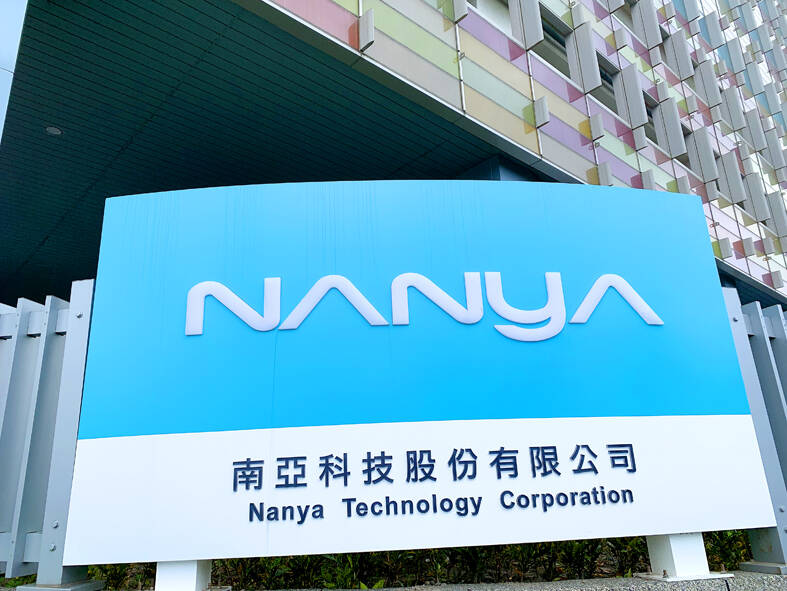Nanya Technology Corp (南亞科技), the world’s fourth-largest DRAM chipmaker, yesterday posted its smallest quarterly loss since the second quarter of last year as gross margin returned to positive territory for the first time in six quarters, driven by improvements in chip prices.
Losses narrowed to NT$813 million (US$24.95 million) during the quarter ended on June 30, compared with losses of NT$1.21 billion in the previous quarter. On an annual basis, losses widened from NT$771 billion.
Gross margin improved to 2.9 percent, compared with minus-2.9 percent in the first quarter and minus-11.2 percent in the second quarter last year.

Photo: Grace Hung, Taipei Times
Nanya Technology said it would have nearly broke even last quarter, if not for the effects of a massive earthquake in April that led to the company incurring about NT$657 million in damage.
Nanya president Lee Pei-ing (李培瑛) said the company might be able to post a profit this quarter, thanks to improving DDR4 inventory and better average selling prices, following a sequential increase of 12 to 13 percent last quarter.
Earlier this week, TrendForce Corp (集邦科技) predicted that DRAM prices would increase 8 to 13 percent this quarter from a quarter earlier.
The company’s shipments are expected to return to growth this quarter after dropping 5 percent sequentially last quarter, Lee said.
Shipments for the whole of this year are expected to grow 20 percent, given a lower comparison base last year, he said.
As the world’s three major memorychip makers race to produce high-bandwidth memory (HBM) chips and DDR5 modules used in artificial intelligence servers or high-end servers, the companies would produce fewer DDR4 chips, which would benefit Nanya Technology, he said.
However, economic slowdowns in China and Europe, along with geopolitical tensions, would continue to affect the use of DRAM chips used in PCs, smartphones and consumer electronics, Lee said.
China, alone, purchases about 40 percent of mobile DRAM, he said.
Nanya Technology has no plans to produce HBM chips in the short term, as the company’s strategy is to tap the DDR5 market first, he said.
DDR5 chips are also used in high-end cloud-computing devices and PCs, the company said.
The company plans to roll out its first DDR5 modules with 16-gigabit capacity in the second half of this year, with estimated sales contribution reaching about 10 percent of its monthly revenue, Lee said.
Nanya Technology has resumed full production on its chip lines and does not expect a strike by Samsung Electronics Co workers to affect supply and demand in the market, he said.

KEEPING UP: The acquisition of a cleanroom in Taiwan would enable Micron to increase production in a market where demand continues to outpace supply, a Micron official said Micron Technology Inc has signed a letter of intent to buy a fabrication site in Taiwan from Powerchip Semiconductor Manufacturing Corp (力積電) for US$1.8 billion to expand its production of memory chips. Micron would take control of the P5 site in Miaoli County’s Tongluo Township (銅鑼) and plans to ramp up DRAM production in phases after the transaction closes in the second quarter, the company said in a statement on Saturday. The acquisition includes an existing 12 inch fab cleanroom of 27,871m2 and would further position Micron to address growing global demand for memory solutions, the company said. Micron expects the transaction to

Vincent Wei led fellow Singaporean farmers around an empty Malaysian plot, laying out plans for a greenhouse and rows of leafy vegetables. What he pitched was not just space for crops, but a lifeline for growers struggling to make ends meet in a city-state with high prices and little vacant land. The future agriculture hub is part of a joint special economic zone launched last year by the two neighbors, expected to cost US$123 million and produce 10,000 tonnes of fresh produce annually. It is attracting Singaporean farmers with promises of cheaper land, labor and energy just over the border.

US actor Matthew McConaughey has filed recordings of his image and voice with US patent authorities to protect them from unauthorized usage by artificial intelligence (AI) platforms, a representative said earlier this week. Several video clips and audio recordings were registered by the commercial arm of the Just Keep Livin’ Foundation, a non-profit created by the Oscar-winning actor and his wife, Camila, according to the US Patent and Trademark Office database. Many artists are increasingly concerned about the uncontrolled use of their image via generative AI since the rollout of ChatGPT and other AI-powered tools. Several US states have adopted

A proposed billionaires’ tax in California has ignited a political uproar in Silicon Valley, with tech titans threatening to leave the state while California Governor Gavin Newsom of the Democratic Party maneuvers to defeat a levy that he fears would lead to an exodus of wealth. A technology mecca, California has more billionaires than any other US state — a few hundred, by some estimates. About half its personal income tax revenue, a financial backbone in the nearly US$350 billion budget, comes from the top 1 percent of earners. A large healthcare union is attempting to place a proposal before